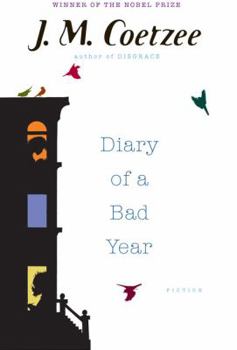Diary of a Bad Year
Select Format
Select Condition 
Book Overview
The latest by the Nobel Prize-winning author of Disgrace is an utterly contemporary work of fiction that addresses the profound unease of countless people in democracies across the world.
Format:Hardcover
Language:English
ISBN:0670018759
ISBN13:9780670018758
Release Date:January 2008
Publisher:Viking Books
Length:231 Pages
Weight:0.84 lbs.
Dimensions:0.9" x 6.5" x 8.6"
Age Range:18 years and up
Grade Range:Postsecondary and higher
Related Subjects
Contemporary Fiction Literary Literature & Fiction Teen & Young Adult World LiteratureCustomer Reviews
5 ratings
A pessimistic quietistic anarchist
Published by Thriftbooks.com User , 16 years ago
In this highly original three-dimensional book, J.M. Coetzee voices his strong opinions on shame and apology as well as on his moral indignation against all kinds of violence (political, economical, social, personal, physical). The Machiavellian State uses physical (torture) as well as social violence by attacking or abolishing civil liberties. The latest legislation in the US, the UK and Australia imposes drastic restrictions on freedom of speech and surveillance of the entire world's telephonic and electronic communications. Those legislators should be `ashamed' and `apology' for their crimes against humanity. But, to the contrary, they consider that they cannot commit a crime, since they are the ones who define crime. He gives strong comments on sex violence (pedophilia) and violence against minorities and animals. He sees a pure free market economy as the battle of all against all, as a `dog-eats-dog' ideology. Withdrawing funds for free independent research in universities is a form of intellectual violence. His reflections on violence include also comments on authors like Dostoevsky and Faulkner. Confronted by a hostile world and a bad year, the pessimistic anarchist finds his ultimate nirvana in art (J.S. Bach, Tolstoy, the classics, photography). I found however two strong caveats in this book. J. M. Coetzee writes: `Western science ... arguing that what cannot be demonstrated scientifically to be true ... cannot be true ... by any standard that counts.' This is not correct. There is no necessary link between science and truth. Truth is correspondence with the facts (A. Tarski). There are scientific, as well as musical (Did Beethoven write symphonies?), forensic (Did he rape her?) or any other kind of truths. J.M. Coetzee writes: `As long as there is not one of us who has the faintest idea of how to go about constructing a housefly from scratch, how can we disparage as intellectually naïve the conclusion that the housefly must have been put together by an intelligence.' (Intelligent Design). This seems to be the same argument used by Subdean William Paley in his `Natural Theology' to prove the existence of God. But that is not the crucial point. As a US judge decided in a famous trial: I.D. is religion. I.D. is part of a counterattack by the second Estate (the clergy) and its powerful allies against those who shred its ideology and concomitantly its power base into pulp. I.D. is backed by the wealthy few and the political Right and used as a weapon in the power struggle for political, financial, energy and other `real' stuff. Richard Dawkins's `The Blind Watchmaker' remains an essential read. Taking to heart G. Lukacz's words that `one's first duty as a writer is to express social and historical processes', J.M. Coetzee continues to tackle head-on the essential problems and also the possible enjoyments of our modern society. He should be an example for all living authors. Highly recommended.
4.5 out of 5: Interesting structure, impeccable execution
Published by Thriftbooks.com User , 16 years ago
This "novel" unfolds in three parallel tracks: a series of "strong opinions" written for an anthology by an aging South African writer living in Australia (Senor C); Senor C's internal thoughts, particularly regarding his young, sensuous typist, Anya; and Anya's internal thoughts. All three tracks share the page, but the structure remains easy to follow. Senor C's strong opinions are interesting in their own right, but the true brilliance of this book is Anya's subtle influence over Senor C's opinions, which become more personal over time. Coetzee delivers an enlightening glimpse into the process of writing and the formulation of a writer's ideas.
No Country For An Old Man
Published by Thriftbooks.com User , 16 years ago
Very interesting writing style and format. Although the plot was pleasantly simple, the writing was quite substantive. It was entertaining, well written, and easy to read, yet it carried with it enlightening passages and interesting political insight. Different style than Coetzee's Disgrace, but his usual wit and brilliance come through nonetheless.
Let's admit it: Coetzee is brilliant
Published by Thriftbooks.com User , 16 years ago
It's remarkable when an author can effectively re-write a genre the way Coetzee does here. What's even more remarkable is his wry self-awareness and subtlety. This book is amazingly crafted; it is methodical and incisive and yet somehow also gentle. I continue to be amazed by Coetzee's skills.
style matters.
Published by Thriftbooks.com User , 16 years ago
After hundreds of years of literature, it is very difficult to invent a new style. This is what Coetzee has done. What sets apart this book is the contrast between the three story line advancing at the same pace on the same pages. The first is the strong opinions of an old semi-anarchist on every subject ; the second is the inner thoughts of an aging man strongly attracted to a young and beautiful "philipina" whom he knows he cannot seduce; and the third is the inner thoughts of the young girl who is aware of her power over men, but use it scarcely.





